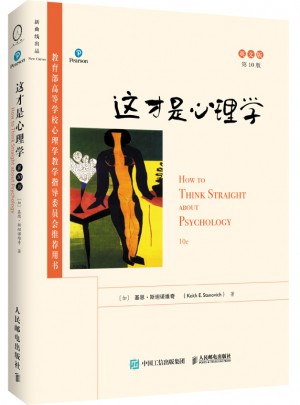

在今天的大众媒体和图书市场上,到处充斥着关于潜能提升、心理操控、色彩星座、催眠读心等伪装成心理学的主题,更有一些伪心理学家、所谓的心理治疗师打着心理学的旗号欺世盗名,从中渔利。在浩如烟海、良莠不齐的心理学信息面前,如何拨除迷雾,去伪存真,成为一个明智的心理学信息的消费者?这本书将教给你科学实用的批判性思维技能,将真正的心理学研究从伪心理学中区分出来,告诉你什么才是真正的心理学。
《这才是心理学》第1版出版于1983年,30多年来一直被奉为心理学入门经典,在全球大学中享有盛誉,现在呈现在读者面前的是英文第10版。这本书并不同于一般的心理学导论类教材,很多内容是心理学课堂上不曾讲授的,也是许多心理学教师在教学中感到只可意会而不可言传的。作者正是从此初衷出发,以幽默生动的语言,结合一些妙趣横生、贴近生活的实例,深入浅出地介绍了可证伪性、操作主义、实证主义、安慰剂效应、相关和因果、概率推理等心理学中的基本原则。与上一版相比,第10版更新了的研究资料和实例以及172篇参考文献。
本书不仅适合于心理学专业的学生,有助于建立心理学研究中必要的批判性思维技能与意识,而其通俗易读性也非常适合所有对心理学感兴趣的读者,它将帮助你纠正对心理学的种种误解,学会独立地评估心理学信息,用科学的精神和方法理解自己和他人的行为。此外,由于心理学与其他学科的共通性,本书也不失为一本精彩有趣的科学哲学类读物。
拨除迷雾,去伪存真,教你如何使用批判性思维,在“伪心理学”横行的时代分辨出什么才是真正的心理学;
清华大学心理学系系主任彭凯平教授特别推荐给普通读者的心理学入门读物;
科学松鼠会推荐的心理学必读书籍;
全球300多所心理学院校采用的心理学入门教材;
第10版,英文原版,原汁原味。
基思 斯坦诺维奇(Keith E. Stanovich),目前担任加拿大多伦多大学人类发展与应用心理学的国家首席教授,他的研究领域是推理和阅读的心理学机制。他于2010年获得格威尔美尔教育奖(Grawemeyer Award in Education)。他至今已发表了200多篇科学论文。在一项对于论文引用率的调查中,斯坦诺维奇位列引用率较高的50位发展心理学家之一,也是25位较高产的教育心理学家之一。他所撰写的《这才是心理学》(How to Think Straight about Psychology)一书被全球300多所心理学高等教育机构采用。
Preface xi
1 Psychology Is Alive and Well (and Doing Fine Among the Sciences) 1
The Freud Problem 1
The Diversity of Modern Psychology 3
Implications of Diversity 4
Unity in Science 6
What, Then, Is Science? 8
Systematic Empiricism 9
Publicly Verifiable Knowledge: Replication and Peer Review 10
Empirically Solvable Problems: Scientists’ Search for Testable Theories 12
Psychology and Folk Wisdom: The Problem with “Common Sense” 13
Psychology as a Young Science 17
Summary 18
2 Falsifiability: How to Foil Little Green Men in the Head 21
Theories and the Falsifiability Criterion 22
The Theory of Knocking Rhythms 23
Freud and Falsifiability 24
The Little Green Men 26
Not All Confirmations Are Equal 28
Falsifiability and Folk Wisdom 29
The Freedom to Admit a Mistake 29
Thoughts Are Cheap 32
Errors in Science: Getting Closer to the Truth 33
Summary 36
3 Operationism and Essentialism: “But, Doctor,What Does It Really Mean?” 37
Why Scientists Are Not Essentialists 37
Essentialists Like to Argue About the Meaning of Words 38
Operationists Link Concepts to Observable Events 39
Reliability and Validity 40
Direct and Indirect Operational Definitions 42
Scientific Concepts Evolve 43
Operational Definitions in Psychology 45
Operationism as a Humanizing Force 47
Essentialist Questions and the Misunderstanding of Psychology 49
Summary 51
4 Testimonials and Case Study Evidence: Placebo Effects and the Amazing Randi 53
The Place of the Case Study 54
Why Testimonials Are Worthless: Placebo Effects 56
The “Vividness” Problem 59
The Overwhelming Impact of the Single Case 62
The Amazing Randi: Fighting Fire with Fire 64
Testimonials Open the Door to Pseudoscience 65
Summary 71
5 Correlation and Causation: Birth Control
by the Toaster Method 73
The Third-Variable Problem: Goldberger and Pellagra 74
Why Goldberger’s Evidence Was Better 75
The Directionality Problem 78
Selection Bias 79
Summary 83
6 Getting Things Under Control: The Case of Clever Hans 85
Snow and Cholera 86
Comparison, Control, and Manipulation 87
Random Assignment in Conjunction with Manipulation
Defines the True Experiment 88
The Importance of Control Groups 90
The Case of Clever Hans, the Wonder Horse 95
Clever Hans in the 1990s 97
Prying Variables Apart: Special Conditions 100
Intuitive Physics 102
Intuitive Psychology 103
Summary 106
7 “But It’s Not Real Life!”: The “Artificiality” Criticism and Psychology 107
Why Natural Isn’t Always Necessary 107
The “Random Sample” Confusion 108
The Random Assignment Versus Random Sample Distinction 109
Theory-Driven Research Versus Direct Applications 110
Applications of Psychological Theory 115
The “College Sophomore” Problem 117
The Real-Life and College Sophomore Problems in Perspective 120
Summary 121
8 Avoiding the Einstein Syndrome: The Importance of Converging Evidence 123
The Connectivity Principle 124
A Consumer’s Rule: Beware of Violations of Connectivity 125
The “Great-Leap” Model Versus the Gradual-Synthesis Model 126
Converging Evidence: Progress Despite Flaws 128
Converging Evidence in Psychology 130
Scientific Consensus 134
Methods and the Convergence Principle 136
The Progression to More Powerful Methods 137
A Counsel Against Despair 139
Summary 142
9 The Misguided Search for the “Magic Bullet”: The Issue of Multiple Causation 143
The Concept of Interaction 144
The Temptation of the Single-Cause Explanation 147
Summary 150
10 The Achilles’ Heel of Human Cognition:
Probabilistic Reasoning 151
“Person-Who” Statistics 153
Probabilistic Reasoning and the Misunderstanding
of Psychology 154
Psychological Research on Probabilistic Reasoning 156
Insufficient Use of Probabilistic Information 157
Failure to Use Sample-Size Information 159
The Gambler’s Fallacy 161
A Further Word About Statistics and Probability 163
Summary 165
11 The Role of Chance in Psychology 167
The Tendency to Try to Explain Chance Events 167
Explaining Chance: Illusory Correlation and the Illusion of Control 170
Chance and Psychology 172
Coincidence 172
Personal Coincidences 175
Accepting Error in Order to Reduce Error: Clinical Versus Actuarial Prediction 176
Summary 183
12 The Rodney Dangerfield of the Sciences 185
Psychology’s Image Problem 185
Psychology and Parapsychology 186
The Self-Help Literature 188
Recipe Knowledge 190
Psychology and Other Disciplines 192
Our Own Worst Enemies 193
Isn’t Everyone a Psychologist? Implicit Theories of Behavior 199
The Source of Resistance to Scientific Psychology 200
The Final Word 205
References 207
Credits 229
Name Index 230
Subject Index 237
这本“与众不同的心理学”教科书,总结了心理学家的职业特质,让每一位读者都有机会去理解我们心理学家是如何去思考、分析和解读人类的行为和心理的。每一章都将一个常识的、朴素的、直觉的有关人类心理的分析和思考与一个科学的、严谨的、心理学的分析和思考相对比,以帮助读者理解心理学家的分析逻辑和研究思路。
彭凯平教授 清华大学心理学系系主任
美国加州大学伯克利分校心理学系终身教授
这本书在第1版时,我已经开始把它推荐给我的学生,那是三十多年前的事了。现在它已经出到第10版了,可见它深受几代老师及学生的喜爱。这本书之所以能如此有生命力,我想主要是因为作者能把一个非常枯燥及严肃的题材讲得那么生动易懂,引起老师和学生们在课堂上热烈的讨论及哈哈的笑声。阅读本书,可以让人们认识到及分辨出什么样的研究及数据才是真正科学的及可信的。为此,我不单只把它推荐给大专院校心理学系的学生作为研究方法课的教材,也强烈推荐给一般读者。
杨中芳教授
中国社会科学院社会学研究所社会心理研究中心客座研究员
心理学本身已经离弗洛伊德那个年代很远很远了。如果你是一个心理学爱好者,或者心理学初学者,又或者是高考填志愿想选择心理学为专业的学生,都强烈建议你们看一下这本书,这也许与你想象中的心理学有巨大的差别,但是这才是目前心理学发展的真正方向!
读者
是英文版,我的英文不好,喜欢心理学,就一同来研究学习。印刷及纸质、包装都很好。
很喜欢!!!
没货没货没货没货没货没货没货没货没货没货
对于专业课非常有帮助